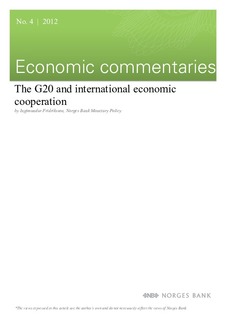| dc.contributor.author | Fridriksson, Ingimundur | |
| dc.date.accessioned | 2018-08-16T12:14:48Z | |
| dc.date.available | 2018-08-16T12:14:48Z | |
| dc.date.issued | 2012 | |
| dc.identifier.uri | http://hdl.handle.net/11250/2558282 | |
| dc.description.abstract | The G20 played a pivotal role in responding to the global economic and financial crisis in early 2009. Its collective response in the later phases of the crisis may be said to have been less resolute. In the face of the severity of the global economic and financial crisis, the G20 Leaders nevertheless agreed in November 2011 to strengthen the resources of the IMF to allow it to continue to play its systemic role. To achieve that, they asked their finance ministers to work on deploying a range of various options by their next meeting. That meeting was held on February 25-26 but did not result in agreement on this issue. The ministers will meet again in April. These important deliberations and the role of the G20 in them are among the motivations for writing this note. The purpose is to shed light on the nature and work of the G20 and its achievements and challenges, particularly relating to the global economic and financial crisis. | nb_NO |
| dc.language.iso | eng | nb_NO |
| dc.publisher | Norges Bank | nb_NO |
| dc.relation.ispartofseries | Economic Commentaries;4/2012 | |
| dc.rights | Attribution-NonCommercial-NoDerivatives 4.0 Internasjonal | * |
| dc.rights.uri | http://creativecommons.org/licenses/by-nc-nd/4.0/deed.no | * |
| dc.title | The G20 and International Economic Cooperation | nb_NO |
| dc.type | Others | nb_NO |
| dc.description.version | publishedVersion | nb_NO |
| dc.subject.nsi | VDP::Samfunnsvitenskap: 200::Økonomi: 210::Samfunnsøkonomi: 212 | nb_NO |
| dc.source.pagenumber | 12 | nb_NO |

